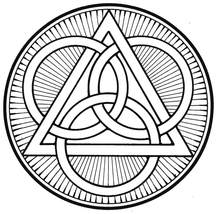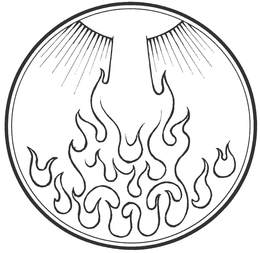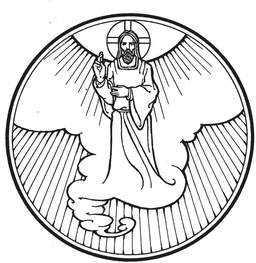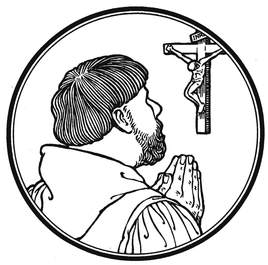The Holy Trinity Reveals Himself to Sinners We bless the Holy Trinity—the Lord of heaven and earth, the God of our fathers—because He is the God who has mercy on us. Just as His Being is beyond our understanding, even more so is His mercy. That mercy comes to us most pointedly in the waters of Holy Baptism. And that mercy delivered by the Holy Father in the Blood of the Holy Son through the Holy Spirit gives us the ability and boldness to confess the true faith. So our prayer is that this Triune God would continue and keep us steadfast in this Faith. When Isaiah beheld the glory of the Lord, he cried out “Woe is me!” For the sinner cannot stand in the presence of a holy God and live (Is. 6:1–7). But God the Father lifted up His Son Jesus for us on the cross, that whoever believes in Him should not perish but have eternal life. This eternal life of Christ is given us according to the Holy Spirit’s good pleasure in Baptism. “Unless one is born [again] of water and the Spirit, he cannot enter the kingdom of God” (John 3:5). To sinners in fear of death, the messengers of God place on our lips the living body and blood of Christ and speak His words of absolution, “Your guilt is taken away, and your sin atoned for” (Is. 6:7). Having received forgiveness and life from the Father through the Son by the Holy Spirit, we join with the angels in praising the blessed Trinity, “Holy, holy, holy is the LORD of hosts!” (Is. 6:3). “For from Him and through Him and to Him are all things. To Him be glory forever. Amen” (Rom. 11:33–36).
0 Comments
The Holy Spirit Gives Peace
The Feast of Holy Pentecost, celebrated today, is also called “Whitsunday,” or “White Sunday.” This is a reference to the white robes of the newly baptized historically worn on this day. Yet, the liturgical color for today is red, the color of the Holy Spirit, taken from the fire that lit on the heads of the Eleven as the Spirit came. Pentecost is among the oldest observances of the Christian Church. As the second greatest Feast of Christendom, Whitsunday or Pentecost ranks only behind Easter in the Church's “Year of Grace.” Pentecost was observed as an Octave, meaning that the Feast took liturgical precedence over the subsequent seven days, as early as the 5th century A.D.
Following the flood, Noah’s descendants failed to spread out and fill the earth as God had spoken. Rather, they exalted themselves; with “one language and the same words” (Gen. 11:1) they spoke proudly and arrogantly. The Lord humbled them by confusing “the language of all the earth,” dividing and dispersing the people (Gen. 11:9). That dispersal was reversed on Pentecost Day (the fiftieth day of Easter), when God caused the one Gospel of the Lord Jesus Christ to be preached in a multitude of languages. “At this sound the multitude came together” (Acts 2:6), for the preaching of Christ is the primary work of the Holy Spirit, whereby He gathers people from all nations into one Church. The Holy Spirit teaches and brings to our remembrance the words of Jesus, which are the words of the Father who sent Him. These words bestow forgiveness and peace to those who keep and hold on to them in love for Jesus. “Peace I leave with you; my peace I give to you. Not as the world gives do I give to you. Let not your hearts be troubled, neither let them be afraid.” (John 14:27).
All Things Have Been Placed Under Jesus’ Feet
Forty days ago, the darkness of Lent was dispelled by the light of Easter. For forty days, the Church has cried, “Christ is risen! He is risen indeed!” But forty days after Jesus rose from the dead, he departed from his disciples and was enthroned in glory in heaven. From heaven he rules all things as our Lord and King. Today we celebrate the day he ascended (“went up”) to glory. But he promised not to leave his disciples alone. He promised to send them the Holy Spirit. They waited ten more days, and then on the Festival of Pentecost (“fiftieth day”) they saw Jesus’ promise made good. Ten days from today, we will celebrate that 50th day, the day of Pentecost.
The Father Answers Our Prayers Because of Jesus
Rogate comes from the Latin rogare which means, “to ask,” a reference to the strong theme of prayer in the Propers (Collect, Lessons, Hymns) for today. In ancient practice, the Monday, Tuesday, and Wednesday prior to the Ascension of Our Lord were known as Rogation Days. These days of early summer were times of special prayer for the protection of the crops. The Major Rogation was on April 25, also the Feast of St. Mark. The Introit for Rogate, “Declare this with a shout of joy, proclaim it, send it out to the end of the earth;…” is from Isaiah 48:20, a joyful proclamation of the freedom of Israel from the Babylonian captivity, and of God’s gracious deliverance of His people. The Gospel for Rogate, like those for the preceding Sundays--Cantate and Jubilate—all point to the Ascension, and hence point the eyes of the faithful to our risen Lord’s eternal reign in heaven.
To pray in Jesus’ name is to pray as one who has been baptized. For it is in the water that He put His name upon you, claiming you as His own, making you a son of God with access to the Father. By His incarnation and crucifixion, our Lord Jesus broke through the barrier of sin which separated us from God, opening a portal to the Father. Like Moses in the wilderness, Jesus is our go-between and intercessor before the throne of heaven. He was lifted up for us on the cross that we might be saved and restored to fellowship with the Father. Looking into this perfect teaching of liberty we pray with boldness and confidence as dear children of God.
|
Archives
February 2019
Categories
All
|
||||||||||||||||||||||||

 RSS Feed
RSS Feed
